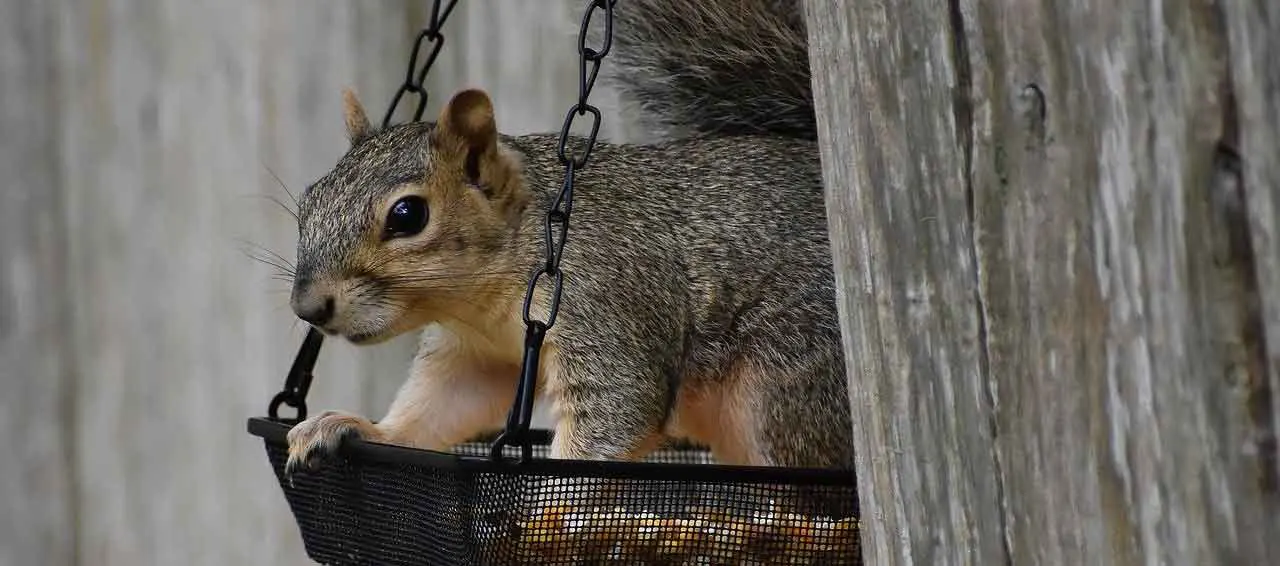What You Need to Know About Squirrel Behavior
Habits and Characteristics
Squirrels exhibit a variety of interesting behaviors and characteristics. Understanding these can help in managing their presence in your environment. Here are some key habits and characteristics of squirrel behaviour.

Feeding Habits
- Squirrels are omnivores meaning they consume a wide variety of food sources depending on their availability. These foods range from the most common such as nuts, seeds, fruits, and fungi to those less common such as insects, small animals, and bird eggs.
- Squirrels are infamous for storing food; burying nuts and seeds as food sources during the winter months when food is scarce.
Nesting Habits
- A squirrel's nest is referred to as a drey. These nests are commonly made out of twigs, leaves, and other materials.
- Drey’s can be easily identified in the forks of tree branches, but another common place for squirrels to nest inside of attics.
- Squirrels may often build and maintain more than one nest within their territory in case one nesting site becomes compromised.
Activity Patterns
- Squirrels are considered diurnal animals, meaning their primary activity times are during the day; typically early morning.
- Although squirrels do not hibernate, they are indeed less active during the winter and will be seen less frequently while they rely on their cached food supplies.
Reproductive Behaviour
- Squirrel’s typically nest two times a year; early in the spring and through the middle of summer meaning their young usually will appear around March and then later again in August.
- The gestation period for squirrels is about 40-45 days. Females usually give birth to a litter of 2-8 young. The mother cares for the young until they are weaned at around 8-10 weeks old.
Adaptability
- Squirrels are highly adaptable and can thrive in urban environments. They are often seen in parks, gardens, and suburban areas where food is plentiful.
- Squirrels are known for their intelligence and problem-solving abilities. They can figure out how to access bird feeders and other food sources, demonstrating impressive persistence and ingenuity.
- Squirrels are also very keen at exploiting rotting wood or weak points in roofs and can very easily chew through these areas to create entry points for protective cover and nesting areas.
Types of Squirrel Damage
Squirrels can cause various types of damage, particularly when they invade homes, gardens, and other human environments. Here are some common types of squirrel damage:
Structural Damage
- Squirrels often gnaw on eaves, soffits, vents, and other parts of buildings to gain access to attics or wall spaces. This can lead to holes and weakened structures and also create other structural damage internally.
- Once inside attics, squirrels can tear up insulation to create nests, reducing the insulation's effectiveness and increasing energy costs. They can also chew on electrical wires creating fire hazards, power outages, and costly repairs.
- Squirrels may also chew on roof shingles and flashing while attempting to gain access to attics, leading to potential leaks and water damage.
- Squirrels can also clog gutters with nesting materials, leading to water overflow and potential damage to the roof, walls, and foundation.
Landscape Damage
- Squirrels may eat fruits, vegetables, bulbs, and seeds from gardens, causing significant damage to plants. They may also dig up plants while searching for buried food.
- Squirrels strip bark from trees to access the sap underneath, which can harm young trees and reduce their health and growth.
- Squirrels often raid bird feeders, consuming large amounts of birdseed and potentially damaging the feeders in the process.
Vehicle Damage
- Squirrels may nest in the engine compartments of parked cars, chewing on wiring and other components, which can cause significant damage and costly repairs.
Types of Squirrel Repellents
Natural Repellents
In terms of what repels squirrels, there are some options in terms of natural squirrel repellent that are said to be an effective way to deter these animals without harming them or using harsh chemicals. Here are some natural repellents and methods to attempt to keep squirrels away from your property:
Scents and Smells
With squirrels having such a strong sense of smell, there are a few things you can try to spray to repel squirrels on problem areas around your property:
- Peppermint Oil or Cinnamon Oil: Mix the essential oil with water and spray it around your garden or home.
- Cayenne Pepper: Sprinkle cayenne pepper, red pepper flakes, or chili powder around plants, bird feeders, and other areas. Squirrels dislike the strong, spicy scent. You can also mix Cayenne Pepper with water and create a spray.
- Coffee grounds: Squirrels do not seem to share our love for coffee. Coffee grounds can double as a fertilizer for your plants, too!
- Garlic: Crush garlic cloves and place them in areas where squirrels are active. Alternatively, mix garlic powder with water and spray it around the garden.
- Vinegar: Soak fabric cloths in vinegar and place them in areas where squirrels are a problem. The strong smell can deter them.
Keep in mind that when it comes to squirrel repellent, it needs to be applied frivolously and can wash away very easily with rain. While they may be good temporary solutions, these methods are unlikely to provide a permanent solution to your squirrel problem.
Physical Barriers
- Chicken Wire or Hardware Cloth: Use these materials to create barriers around plants and garden beds. Bury the wire a few inches underground to prevent squirrels from digging underneath.
- Mulch with Sharp Materials: Use materials like pine cones, thorny branches, or coarse mulch around plants. The rough texture can deter squirrels from digging.
- Electric Shock Track can play a role keeping squirrels off of fences and roofs.
These physical barriers are typically only effective at keeping squirrels out of gardens. When it comes to your attic and your home, it is difficult to determine which areas need to be protected before the damage is already done.
Habitat Modification
- Remove Food Sources: Ensure that bird feeders are squirrel-proof, and clean up fallen seeds and nuts. Secure garbage bins and compost piles.
- Trim Trees: Keep tree branches trimmed away from your home to prevent squirrels from gaining easy access to roofs and attics.
By using a combination of these natural repellents and methods, you can create an environment that is less attractive to squirrels in an attempt to protect your property from damage.
Chemical Repellents
Chemical squirrel repellents can be effective in deterring squirrels from gardens, bird feeders, and homes. These repellents typically contain ingredients that squirrels find unpleasant, and they are available in various forms such as sprays, granules, and gels. Here are some commonly used chemical squirrel repellents:
Capsaicin-based Repellents
- Capsaicin is the active component in chili peppers that makes them hot. Squirrels are highly sensitive to capsaicin and using this spray to repel squirrels helps to deter them from chewing.
- Products such as Critter Ridder and Squirrel Stopper contain capsaicin and can be distributed in gardens and areas where squirrels are a problem.
Methyl Nonyl Ketone
- A synthetic organic compound with a strong, unpleasant odor that deters squirrels.
- Often found in a spray form and can be sprayed in areas where squirrels are an issue.
Ammonia-Based Repellents
- Ammonia has a strong smell that can be off-putting to squirrels.
- These types of squirrel repellents can typically be purchased in the form of predator urine, such as fox or coyote, which mimic the scent of natural predators
Mothballs
- Mothballs contain naphthalene, which has a strong odor that can repel squirrels.
- Mothballs can be placed in attics, garages, or other areas where squirrels are a problem. However, they should be used with caution as they are toxic to humans and pets.
Bitter-Tasting Repellents
- These repellents contain bittering agents that make plants and other materials taste unpleasant to squirrels and help to prevent chewing in problem areas
By using chemical products as chipmunks and squirrels repellent in conjunction with other deterrent methods, such as physical barriers and habitat modification, you may have some success in effectively managing and reducing squirrel activity around your property.
Electronic Repellents
- Wind chimes or ultrasonic devices can emit high-frequency sounds to deter squirrels. We have not found these to be particularly successful.
- The use of motion-activated sprinklers can detect movement and spray water to scare squirrels away from the area
Factors to Consider When Choosing a Squirrel Repellent
Property and Environment
Depending on your individual situation, whether squirrels are becoming a nuisance in your garden or they are actively moving into your home; your technique for how to repel squirrels will vary. Once squirrels have entered your home, they are a lot more difficult to deter on your own and you may require professional wildlife intervention.
Safety and Environmental Impact
Always use caution and read and follow the labels when using chemical repellents as they may be harmful to animals in certain doses. Chemical repellents often need to be reapplied, especially after rain, so it is very important to take note of how much of these chemicals you are using as accumulation may cause an unwanted environmental impact. Since some chemical repellents can be harmful if ingested or when they come in contact with skin, it is important to ensure that the repellents you choose are safe for use around pets and children.
Effectiveness and Longevity
When considering how to repel squirrels from your home, there are a wide variety of options. Natural and Chemical repellents can be helpful, but they are typically short term solutions and require constant reapplication and tedious maintenance. Physical barriers are by far the most effective in terms of keeping squirrels out of your home and garden but It is important to note that once a squirrel has entered your attic, physical barriers cannot be used as they can trap the animals inside your home. If the animals become trapped inside your home, this will only lead to more damage.
Still Having Squirrel Issues? Call Up Hawkeye!
When it comes down to it, we all want the best squirrel repellent, especially if the squirrels have already entered our homes. Thankfully, Hawkeye has you covered. We offer squirrel trapping and permanent removal of any trapped squirrels on your property. Not only can we deal with squirrels in your yard, but traps can also be placed to remove squirrels in your attic as well. Our licensed technicians will assess your situation to determine a custom solution for you. Once all squirrels have been removed from your attic we will use a heavy duty wire mesh to seal off any openings to prevent the entry of any other animals. Contact Hawkeye today for a permanent squirrel removal.














